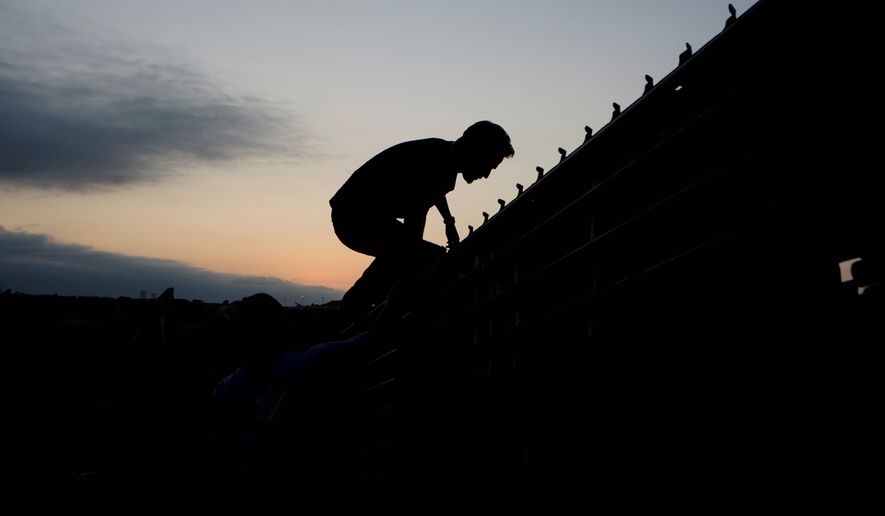The Department of Homeland Security is ramping up a new campaign to try to persuade Central American families not to make the perilous journey to jump the U.S. border, as new statistics suggest that last summer’s surge could be happening again.
The effort comes as the administration fights a federal judge who is trying to severely limit detention of illegal immigrant families, once again testing President Obama’s standing in the Hispanic- and immigrant rights communities.
In a court filing last week, Border Patrol Deputy Chief Ronald Vitiello said they saw a rise in illegal immigrant families crossing into the U.S. in July, which was surprising as it breaks the usual pattern in which a decrease occurs as the year wears on and the immigrants’ journey through the late-summer heat becomes more difficult.
The Obama administration said things could get even worse should Judge Dolly M. Gee’s decision to curtail detention of illegal immigrants stand, because it will serve as an invitation for more people to try — and to “incentivize” them to bring their children along on the dangerous trip, using them as human shields, of sorts, to avoid deportation.
Hoping to head off a surge now, the administration kicked off a public relations campaign last week to send the message to would-be immigrants in Honduras, El Salvador, Guatemala and Mexico — and to their relatives already here in the U.S. who might encourage them — that there is no legal status awaiting them.
“There are no permisos,” Customs and Border Protection Commissioner R. Gil Kerlikowske said at a press conference in El Paso, Texas, pushing back against a message that smugglers employed to entice tens of thousands of illegal immigrants to make the journey in the late spring and early summer last year.
What illegal immigrants called “permisos,” or free passes, were the court documents issued by immigration authorities. Because the U.S. didn’t have the political will, capacity or, in some cases, the legal authority, to hold the illegal immigrants while awaiting deportation, most of them were given a notice to appear for an upcoming court date and were released.
To the U.S., that constituted enforcement, but to the immigrants that meant a chance to disappear into the shadows with the 11 million other illegal immigrants already here — thus the free pass.
Faced with that reality, the Obama administration sought to stiffen enforcement. And while the law prohibited detaining children traveling without their parents, it did not prohibit the detention of families, so Homeland Security opened new facilities to boost family detention space from fewer than 100 beds to several thousand.
But Judge Gee late last month issued a ruling that found much of family detention violates a 1990s-era court settlement. She has threatened to severely limit the amount of time women and children can be held and the conditions in which they can be held.
If she stands firm, the administration could have to revamp or shut down all of its family facilities.
The Justice Department filed briefs Thursday signaling it will fight that determination, arguing that Judge Gee is stretching the so-called Flores settlement beyond its original boundaries. The lawyers argued that if smugglers or would-be illegal immigrants learn that traveling with children could get them out of detention, it could entice more of them to bring youngsters along on the trip.
“Specifically, the proposed remedies could heighten the risk of another urge in illegal migration across our Southwest border by Central American families, including by incentivizing adults to bring children with them on their dangerous journey as a means to avoid detention and gain access to the interior of the United States,” Deputy Assistant Attorney General Benjamin C. Mizer said in the court papers.
Immigrant rights advocates were enraged by the move.
“The writing is on the wall — family detention is unacceptable, un-American, and will end,” said Reps. Luis V. Gutierrez, Zoe Lofgren and Lucille Roybal-Allard, three leading Democrats on immigration. “Rather than fight the court’s ruling, the right and moral response is to swiftly take the necessary steps to bring our nation’s detention policy in line with the Flores settlement agreement.”
Representatives of Human Rights First, another group, visited one of the detention facilities last week, just days after Judge Gee’s ruling, and said they found conditions had worsened, with Immigration and Customs Enforcement officers setting bonds too high for families to be able to meet.
Human Rights Watch also disputed the government’s assertion that most mothers and children are being quickly released.
The administration now acknowledges that it cannot use detention as a deterrent, and it has taken other steps to more quickly process illegal immigrant families, making initial asylum claim determinations much faster than in previous years, which reduces the time many of them remain in detention.
But officials told Judge Gee that they need to detain families for at least a few days in order to make their determinations and conduct necessary health screenings.
The Justice Department asked for a hearing later this month to present more evidence to the court, hoping to convince the judge that she misread the situation and to change her preliminary ruling.
Meanwhile, border officials are preparing for what could be a new surge, if smugglers use Judge Gee’s ruling to entice a new wave of crossers.
The public information campaign Mr. Kerlikowske kicked off last week involves broadcast and print ads promising stiff enforcement of immigration laws.
Similar approaches have been used the past two years — though a new watchdog report from the Government Accountability Office said there is no evidence the past campaigns worked.
• Stephen Dinan can be reached at sdinan@washingtontimes.com.




Please read our comment policy before commenting.